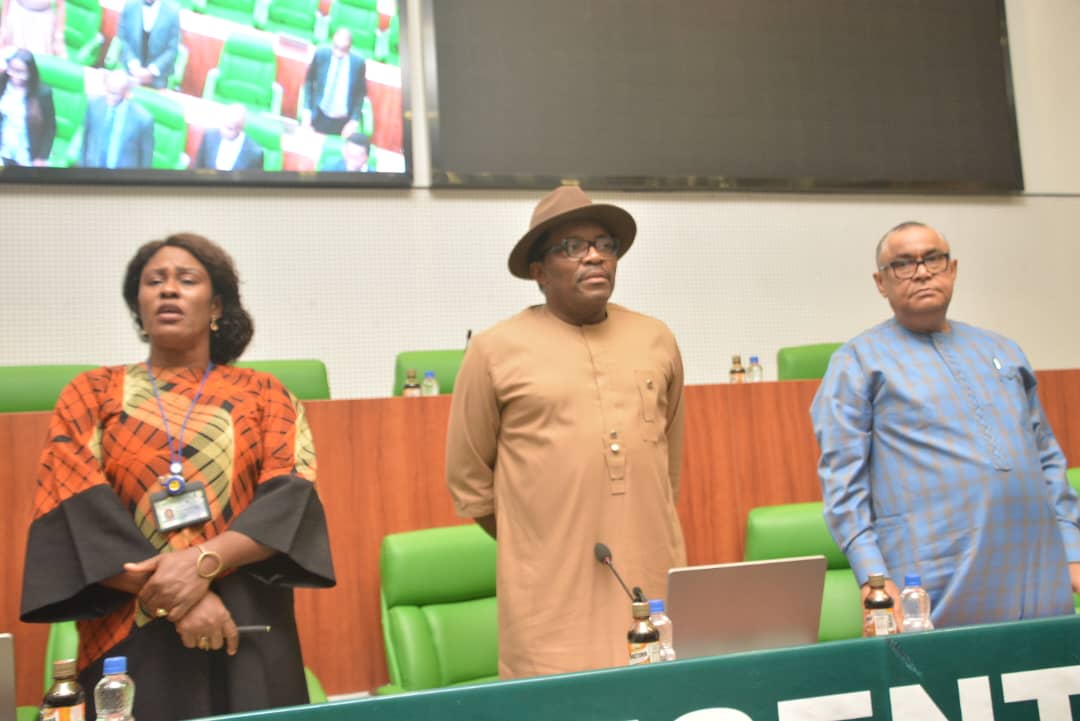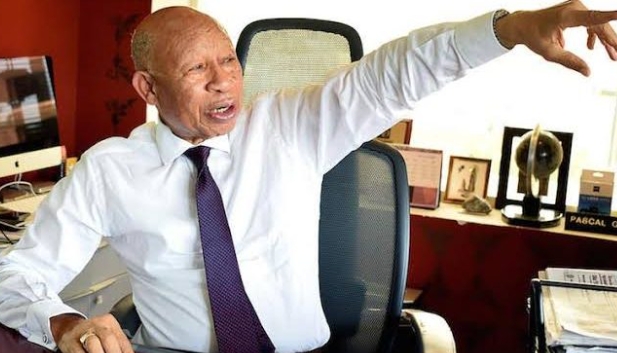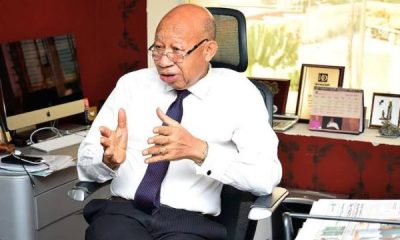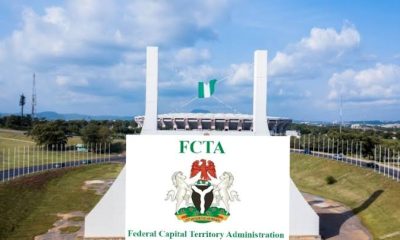News
‘Why New Supreme Court Justices can’t resume now’

In this report, Vanguard’s Law & Human Rights digs out factors responsible for the delay in the inauguration of 11 new justices of the Supreme Court almost two full months after the Nigerian Senate had confirmed their appointment.
Background
On December 21, 2023, the Nigerian Senate approved a list of 11 new justices for the Supreme Court of Nigeria, SCN.
The senators had cleared the justices at the plenary through a voice vote after the Chairman of the Committee on Judiciary, Mohammed Monguno (APC, Borno), reported that his committee received the curriculum vitae of the nominees, invited them for screening and found that they demonstrated inspiring competence required for the performance of their assignment.
Monguno also noted that the nomination and appointment satisfied the constitutional provision of section 231 (3) of the Constitution which states that an individual needs 15 years experience in the bar to be qualified for appointment into the Supreme Court bench.
He said there were no petitions or criminal records against any of the nominees and that the committee members were satisfied with the nomination of the justices and, therefore, recommended their confirmation.
The list of the justices was sent to the upper chamber of the National Assembly by President Bola Tinubu following recommendation of the candidates by the National Judicial Council, NJC from the shortlist received from the Federal Judicial Service Commission, FJSC for the top job.
On the recommended list were Haruna Tsammani representing the North-East; Moore Adumein (South- South); Jummai Sankey (North-Central); Chidiebere Uwa (South-East); Chioma Nwosu-Iheme (South-East) and Obande Ogbuinya (South-East).
Others were Justices Stephen Jona Adah (North-Central); Habeeb Abiru (South-West); Jamilu Tukur (North- West); Abubakar Umar (North-West); and Mohammed Idris (North-Central).
Section 231 (2) of the 1999 Constitution of the Federal Republic of Nigeria spells out the process of appointing justices for the SCN.
The section provides: “The appointment of a person to the office of a Justice of the Supreme Court shall be made by the President on the recommendation of the NJC, subject to confirmation of such appointment by the Senate.
By implication, both the executive and the legislature play distinct roles in appointing justices for the apex bench.
The appointment process into the Supreme Court bench would be inchoate until the two other arms of government have fully played their roles as spelt out in the constitution.
But almost two months after the justices were cleared by the Senate and more than two years when the Supreme Court has been itching to get more competent hands to fill vacant seats in the court, the 11 new justices are yet to be inaugurated.
The Supreme Court has kept mum on the issue ditto for the Presidency in spite of the alarm raised by a retiring justice of the Supreme Court, Justice Dattijo Muhammad on October 27, 2023, in Abuja that with his exit, the number of justices serving in the apex court had dropped to 10, its lowest in the contemporary history of the court.
The Chief Justice of Nigeria, CJN, Justice Olukayode Ariwoola had himself consistently lamented that the apex court has been battling with workload crisis arising from manpower shortage, explaining that the situation gets worse for the third arm of government because in every little disagreement, Nigerians rushed to court and in every lost case, they rushed to appeal even up to the Supreme Court, no matter how little the issue might be.
He had said that alone had obviously accounted for the several appeals pending in the Supreme Court, adding that though the court received scathing criticisms from members of the public over its over-bloated docket, yet the institution is neither in any position to regulate case inflow to the court nor has the supernatural powers to attend to all in one-fell-swoop.
What is delaying the inauguration of the 11 new justices?
Vanguard’s Law & Human Rights’ investigation revealed that the 11 new justices are yet to be inaugurated simply because the Supreme Court was having challenges providing them with the required working tools.
According to an impeccable source at the Supreme Court who spoke with Vanguard on condition of anonymity, the justices’ inauguration was deliberately delayed.
His words: “You were aware some justices of the Supreme Court were sworn in on November 6, 2020. As tradition demanded, they were supposed to be given three assorted brand new cars each: A Mercedes Benz, a Land Cruiser and one utility vehicle.
“But at that time, the justices of the Supreme Court were given only a Land Cruiser which some critics said were refurbished. A Hilux was added after one year while the Mercedez Benz was late in coming. Because of the breach of that tradition, hell was let loose.
“We want to avoid such unnecessary bad image for the Supreme Court this time around. What is sure is that the justices have been appointed already. The Senate has given approval. That approval cannot be withdrawn.
“All that is left now is for necessary working tools to be provided. We do not want to inaugurate them without providing the necessary things that may attract bad press for the institution,” the source added.
The source also told Vanguard that apart from the issue of cars, accommodation was another.
“You will agree with me that the issue of accommodation for serving justices of the Supreme Court has been a recurring challenge.
“This is the first time we are having a full complement of 21 justices. They can’t live in the air. They must be made comfortable. The Supreme Court will have to acquire apartments for them.
“I can confirm to you that the Supreme Court has gone far. But the court is yet to get comfortable accommodation for all of them.
“Until that one is sorted out, they may have to tarry,” he said.
Another source and member of the Federal Judicial Service Commission, FJSC, who also pleaded anonymity, told Vanguard Law and Human Rights that the affected new justices have been asked to use the opportunity of the delay in inaugurating them to quickly conclude all outstanding cases they have at the Court of Appeal on the account that they would not have the opportunity of going back to sit on such cases as justices of the Court of Appeal.
The source reminded Vanguard of what happened sometime in May 2020 when the Supreme Court, in a unanimous decision by a seven-man panel of Justices led by Justice Bode Rhodes-Vivour (now retired), nullified the entire proceedings that led to the conviction of a federal lawmaker representing Abia North Senatorial District, Dr Orji Uzor Kalu, his company—Slok, and a former Director of Finance in Abia State, Jones Udeogu, for allegedly using the firm to defraud the Government of Abia State in the eight years Kalu held sway as governor of the state.
Vanguard indeed recalled that the Supreme Court had in the lead verdict that was read by Justice Ejembi Eko, held that the trial High Court Judge, Justice Mohammed Idris, acted without jurisdiction in the case when he convicted Kalu, his firm, Slok Nigeria Limited and a former Director of Finance in Abia State, Jones Udeogu since he was no longer a judge of the Federal High Court as at December 5, 2019, when he sat and delivered the judgement that convicted the defendants for allegedly stealing about N7.1billion from Abia State treasury.
According to the Supreme Court, Justice Idris, having been elevated to the Court of Appeal before then, lacked the powers to return to sit as a High Court Judge.
It held that the Fiat that was issued to him by the Court of Appeal President pursuant to section 396(7) of the Administration of Criminal Justice Act, ACJA, 2015, was unconstitutional.
The apex court held that no statute in Nigeria empowered the Court of Appeal President to give vires to a Justice of the appellate court to return to the High Court to deliver judgement in a pending criminal trial, stressing that the Court of Appeal President, “acted ultra-vires his powers when she purportedly gave the authorisation” with respect to Kalu’s case.
But the source hinted that the 11 new justices of the Supreme Court would be inaugurated very soon as their services are very much required at the apex court.
S’Court to get full complement of 21 justices for the first time since 1999
Hopefully, when the justices resume office by the end of the month, the Supreme Court would have a full complement of 21 justices for the first time since 1999 with five representing the North-West; four of the justices representing the South-West geo-political zone of the country, three representing the South-East, another three representing the North-East, three others representing the South- South, and the remaining three representing the North-Central.
Whereas, Section 230 (2) of the 1999 Constitution allows the sitting President to appoint a Chief Justice of Nigeria, CJN and other justices of the Supreme Court not exceeding 21, the highest number of justices appointed to the Supreme Court ever was 20 since the constitution was promulgated into law.
Specifically, that history was made on November 6, 2020 when eight (8) newly appointed Justices of the Supreme Court were sworn into office, upping its membership from 12 to 20.
News
NLC Warns Abure to Step Aside, Urges LP Members to Be on Standby

By Gloria Ikibah
The Nigeria Labour Congress (NLC) has issued a stern warning to Julius Abure, following the Supreme Court ruling on April 4, 2025, which declared the tenure of Mr. Abure and his National Working Committee (NWC) as expired and no longer legally recognized.
Despite the court’s clear ruling, Mr. Abure has continued to release statements insisting he remains the chairman of the Labour Party (LP). The NLC has strongly condemned his actions, describing them as “an affront” to the rule of law and the authority of Nigeria’s highest court.
In a statement signed by the NLC President, Comrade Joe Ajaero, the Congress accused Abure and his supporters of “crass disdain for decency” and warned that the patience of Nigerian workers and genuine LP members is wearing thin.
“The current affront of Mr. Julius Abure and co-travellers against the law… has convinced those who doubted our earlier position that Mr. Julius Abure and the few miscreants following him have sworn themselves to utter impunity,” the statement read.
The NLC also debunked allegations that it was planning to attack Labour Party offices, calling such claims false and a distraction from the real issue of compliance with the Supreme Court judgment.
“We use this medium to put every Nigerian worker, Labour Party member, and patriotic citizen on alert. We will no longer condone the antics of inconsequential characters like Mr. Julius Abure,” Ajaero said.
He added that the NLC and its allies would not stand by while the rule of law is undermined and urged all genuine members of the Labour Party to prepare to “peacefully repossess all offices of Labour Party nationwide.”
According to the statement, the NLC Political Commission and concerned stakeholders will soon issue directives on how this will be carried out. They also called on security agencies, especially the Nigeria Police and the DSS, to uphold their constitutional responsibilities and support the enforcement of the Supreme Court’s judgment.
The statement also urged the Independent National Electoral Commission (INEC) to fully comply with the court’s ruling by removing all traces of Mr. Abure and his team from its records.
To resolve the current leadership crisis in the Labour Party, the NLC said the remaining institutional members of the party’s National Executive Committee (NEC) are expected to appoint an interim leadership and organize a Special National Convention, as prescribed by the party’s constitution.
“A word is enough for the wise!” Ajaero added.
News
Reps Begin Probe Into Alleged Misuse of Agricultural Funds

By Gloria Ikibah
The House of Representatives has commenced investigations on the alleged mismanagement of funds meant for agricultural development by government agencies outside the Federal Ministry of Agriculture.
Declaring open the inestigation, Chairman Committee on Nutrition and Food Security, Rep.Chike Okafor, said the hearing was to uncover the truth and ensure accountability in the use of public funds.
Rep. Okafor noted that despite trillions of naira reportedly spent on agriculture over the years, Nigeria still battles food shortages, hunger, and high food prices.
“This hearing is not a witch-hunt. Our purpose is not to target individuals or institutions but to uncover the truth, identify systemic failures, and ensure that public funds allocated for agricultural development are utilized transparently and effectively.
“If these funds had been judiciously spent, we would not be facing the current crisis where millions of Nigerians struggle to afford basic meals,” he said.
The probe, according to the Chairman, follows a motion passed by the House titled “Alleged Mismanagement of Government Agricultural Initiatives and Funding by Departments, Agencies, and Government Programs Outside the Federal Ministry of Agriculture and Food Security”.
He listed key institutions under scrutiny, including the Central Bank of Nigeria (CBN), Nigeria Incentive-Based Risk Sharing for Agricultural Lending (NIRSAL), Bank of Industry (BOI), Bank of Agriculture (BOA), and the National Agricultural Development Fund, among others.
Some of the figures raised by the committee include:
– ₦1.12 trillion disbursed to over 4.6 million farmers through CBN’s Anchor Borrowers Programme (ABP),
– ₦215 billion disbursed by NIRSAL to support agriculture and agribusinesses,
– ₦3 billion given to 22,120 smallholder farmers by BOI,
– ₦59.4 billion in loans for agro and food processing businesses,
– ₦5 billion livestock loan facility to BOA in 2023,
– ₦1.6 billion recovery fund released in 2024 by the National Agricultural Development Fund to fight ginger blight disease.
Rep. Okafor explained that the Committee is empowered by the House rules to investigate how these funds were allocated and used, and determine if they truly made an impact.
He demanded foe detailed information from the agencies covering the period between 2017 and 2024, including lists of beneficiaries, addresses, project locations, loan terms, recovery plans, and collaboration with donor partners.
“The Nigerian people deserve to know how their resources are being used, and this Committee is committed to ensuring that every kobo allocated to agriculture serves its intended purpose,” he said.
He also acknowledged that the Bank of Agriculture recently appointed a new Managing Director and confirmed that a letter to that effect has been received by the Committee.
The Chairman therefore urged all agency representatives to be open and sincere in their presentations, and charged the media and civil society to play their part in holding government accountable.
“The goal is not to antagonize but to collaborate in finding solutions. Where there are gaps, let us address them. Where there are inefficiencies, let us correct them. And where there are infractions, let us take necessary actions to prevent recurrence.
“With that, I declare this investigative public hearing open. I look forward to a robust, insightful, and solution-driven deliberation,” he stated.
Governor of Central Bank of Nigeria CBN, Olayemi Cardoso, represented by Mr Kwasari John Harman, an acting director in CBN said the Apex bank disbursed N1.21 trillions and N871 billion among others
He said that all commercial banks in the country received funds from the federal government on the Anchor Borrowers Scheme of the previous administration.
News
Tinubu: Pascal Dozie’s contributions to Nigeria’s economic architecture left an enduring legacy

By Kayode Sanni-Arewa
President Bola Ahmed Tinubu extends his heartfelt condolences to the Dozie family, the business community, and all Nigerians on the passing of Chief (Dr.) Pascal Gabriel Dozie, an elder statesman, entrepreneur, and banker. He was 85.
Chief Pascal Dozie, OON, was a visionary whose contributions to Nigeria’s economic architecture left an enduring legacy.
As the founder of Diamond Bank and the pioneer Chairman of MTN Nigeria, he was at the forefront of two of the most transformative sectors in Nigeria’s development journey: banking and telecommunications.
Chief Dozie, a steadfast believer in Nigeria’s vast potential, was pivotal in shaping the financial services industry and expanding access to mobile connectivity nationwide. His influential leadership extended well beyond corporate boardrooms.
In addition to his business acumen, Chief Dozie served as a former director at the Central Bank of Nigeria, President of the Nigerian Stock Exchange, and Chairman of the Nigerian Economic Summit Group, dedicating decades of service to national policy formulation, private sector development, and youth empowerment.
President Tinubu lauds Chief Dozie as “a rare breed business leader whose wisdom, humility, and pioneering efforts laid a foundation upon which many continue to build. His passing is a profound loss to the private sector and Nigeria.”
The President prays for the peaceful repose of Chief Dozie’s soul and extends his condolences to his wife, children, and extended family. He calls upon the Nigerian private sector to honour Chief Dozie’s memory by upholding the values of integrity, innovation, and nation-building, for which he was renowned.
*Bayo Onanuga
Special Adviser to the President
(Information & Strategy)
-

 News8 hours ago
News8 hours agoJust in: Founder of Diamond Bank and ex-chairman of MTN, Paschal Dozie is dead
-

 News15 hours ago
News15 hours agoRainfall washes away newly constructed multi-million naira road in Edo State
-

 News15 hours ago
News15 hours agoEvangelist Kekere Jesu buried amidst deep sorrow
-

 Metro15 hours ago
Metro15 hours agoStray bullet from VIP convoy kills bystander in Abuja
-

 News9 hours ago
News9 hours agoNaira Nosedives Against Dollar
-

 Sports8 hours ago
Sports8 hours agoReal Madrid keeping tabs on Victor Osimhen
-

 News9 hours ago
News9 hours ago2Baba’s Lover Natasha Osawaru Fired As Edo Assembly Minority Leader
-

 News14 hours ago
News14 hours agoLG autonomy: Govs block council chairmen from opening CBN accounts





